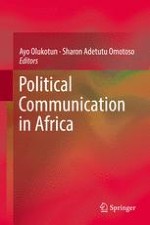2017 | OriginalPaper | Chapter
9. Singing Truth to Power and the Disempowered: The Case of Lucky Mensah and His Song, “Nkratoɔ”
Authors : Obadele Bakari Kambon, Godwin Kwafo Adjei
Published in: Political Communication in Africa
Publisher: Springer International Publishing
Activate our intelligent search to find suitable subject content or patents.
Select sections of text to find matching patents with Artificial Intelligence. powered by
Select sections of text to find additional relevant content using AI-assisted search. powered by
